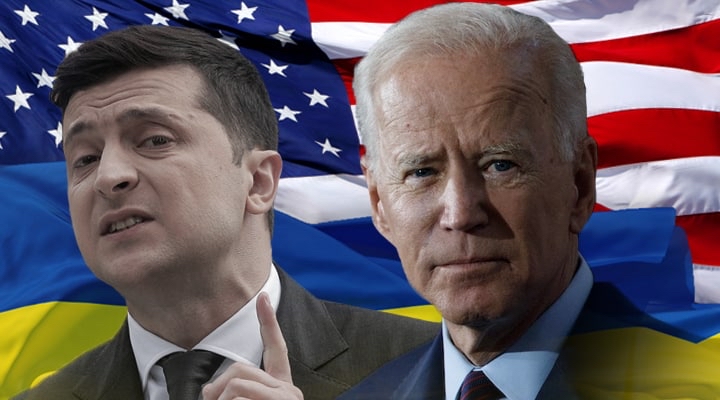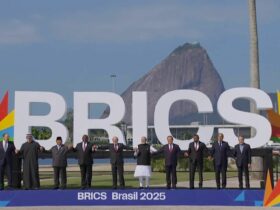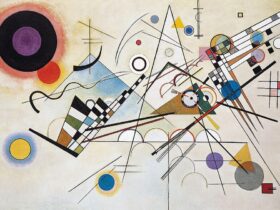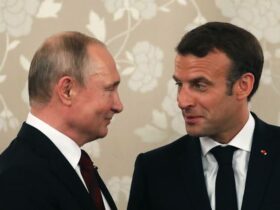Last month, a new step of the Ukrainian administration shook the political arena of Ukraine: the National Security and Defence Council adopted a decision of closing 3 TV channels in Ukraine, which belonged to a deputy of Dmytro Kozak and which were known to have a pro Russian orientation. Those three TV channels, namely 112, News One and ZIK were accused of making pro-Russian propaganda. The President of Ukraine Volodymyr Zelensky approved closing those three channels. This was an unexpected step from Zelensky, since he came to power 2 years ago largely (although not completely) thanks to the votes of the pro-Russian electorate.
The official reason of this step is that the pro-Russian deputy Dmytro Kozak is accused of dealing with coal trade with the breakaway regions of Ukraine. President Zelensky also justified this step by saying that the mentioned TV channels had been spreading “lies and fake news” and he added that the leaders of the G-7 also support Ukraine on this issue.
However, the comments of the Spokesperson of the EU for Foreign Afffairs and Security Issues Peter Stano shows that the EU monitors the situation cautiously.
This event caused various reactions among Ukrainian politicians. Petro Poroshenko, the previous president of Ukraine and now the main political leader of the nationalist electorate and the main political rival of Zelensky says that the initiative is right, however, this is a delayed move. He says that during his rule 3 years ago the Ukrainian Parliament had approved banning those mentioned TV channels, however, the decision at that time wasn’t implemented since just before the elections such a move would have casted a shadow on the legitimicy of the coming election. On the other hand, he critisized Zelensky for delaying this desicion for 2 years (since the time that Zelensky came to power). On the other hand, even some members of Zelensky’s party (Servant of People) hesitated to support this decision. Among them is the Speaker of the Ukrainian Parliament Dmytro Razumkov, who abstained from voting when the issue was held at the session of the National Security and Defence Council. Not all of the Ukrainian experts support such a ban. Many political experts suggest that this step was politically motivated. So, what can be the reasons of this initiative of Zelensky? Let’s try to give some answers:
How Zelensky came to Power?
Volodymyr Zelensky came to power in 2019, by gaining 73% of the votes in the second round of the presidential elections agains his rival Petro Poroshenko, who had got just 24% of the votes in the second round. As soon as he swore to become president, he dissolved the parlament and at the early parlament elections, his party got the majority of the parlament. It was the first time in the history of independent Ukraine when a political party could form government without a coalition. In this way, Zelensky had managed within a very short period of time capture the whole control of the Ukrainian political system. The success was even beyond his expectations. This was also a surprise for many experts in the world, since Zelensky had no previous political experience (as it is widely known, he was a comedian just before the election campaign). His surprise vistory may be explained in this way: First of all, the average Ukrainians were fed up with the previous Ukrainian political elite. Many people, with whom I could make interview before the elections had told me that they would vote for Zelensky, simply because that he has no experience in politics, consequently, he “has no stains”. Most of my answerers said were saying that the experience of the existing politicians was simply an experience in corruption. Secondly, Zelensky got the votes of the southern and eastern regions of Ukraine where Russian language and pro-Russian feelings dominate. Those regions had reacted to the nationalist policies of Poroshenko, who, during his last two years in power introduced Ukrainization policies practically in every sphere of life. Moreover, his attempt to create a “local, national, autonomous Ukrainian church” had caused reaction of the electorate of those eastern and southern regions, who were loyal to the Patriarchate of Moscow. In this situation, Zelensky (who himself is a Russian-speaking person) had adopted an embrasive discourse as his election strategy. In his pre election speeches (which he recorded to video and shared on social media channels), he was reiterating that the system he would build would not embrace everybody, independent from which language they speak and which culture they belong to.
This campaign had great impact and consequently, most of the electorate of the southern and eastern regions, who opposed the nationalistic policies of Poroshenko and who were not satisfied with the old generation of pro-Russian politicians, supported Zelenski (From the beginning of the millenium until the revolution of 2014, the main political power, which represented the electorate of the southern and eastern regions was the Party of Regions of the former President Viktor Yanukovych. After the revolution and the escape of Yanukovych to Russia, that party was dissolved and since the last two years, the main party, which adresses to the pro Russian electorate is the party “Opposition Platform For Life” – OPFL. However, a great part of the electorate of the southern and eastern regions had wanted to see “new faces” in politics, so they had voted for the party “Servant of People”, which also advocated for tolerance to regional culture).
But Zelensky received not only the support of the Russian speaking population: A large part of the nationalist electorate of the western regions also did not support Poroshenko, since they did not perceive Poroshenko “a sincere patriot”. Thus, those voters also voted for Zelensky, since he was the main opponent of Poroshenko. In this way, Zelensky paradoxically gained votes both from the Russian speaking and pro Russian citizens who reacted to the nationalist policies of Poroshenko and from many nationalists, who did not perceive Poroshenko sincere in nationalism.
Consequently, Zelensky got the majority of the votes almost in all of the provinces, while Poroshenko won only in Lviv province. This situation was both the advantage and the weak point of Zelensky. It was an advantage for Zelensky, since he was the first leader after decades who had managed to win in almost all of the provinces and come over the regional partition in Ukraine. But at the same time, this was a disadvantage, since Zelensky’s victory was fragile; it was clear that it would be almost impossible for him to satisfy the both parts of Ukraine: Any attempt to satisfy one part of Ukraine has always called reaction of the other part. In addition, after the presidential and parlamentary elections, former president Poroshenko remained the leader of the nationalist electorate.
How Zelensky’s Policies Changed?
In his first year, Zelensky pursued policies which reflected expectations of southern and eastern regions. Those were, the policy of immediate peace in Donbas (to try to bring an immediate end to the conflict with the pro Russian seperatists), and ignoring some laws which had been adopted during the rule of Poroshenko (the law of decommunization, the law on the status of the Ukrainian Orthodox Church of Moscow Patriarchate). In order to bring immediate ceasefire in the East, the Ukrainian Army had retreated its positions. This had caused reaction among the nationalist electorate of the western regions of Ukraine. Poroshenko’s team claimed that the team of Zelensky consisted of revenshists, who wished to eliminate all of the achievements of the 2014 revolution.
In addition, Zelensky did not realize expectations of many people in economy. In many cases, “new faces” of his team started to be charged with inexperience. Moreover, he did not realize the expectations of the pro-Russian electorate, who expected normalization of relations with Russia. Consequently, Zelensky, who come to power thanks to the support of both pro-Russian and nationalist electorate, found himself in a great dilemma: In the southern and eastern regions, the main pro-Russian political party, the “Opposition Platform – For Life” started to critisize Zelensky for not realizing the expectations of the electorate of southern and eastern regions. In the West, on the contrary, the “European Choice” Party of Poroshenko critisized Zelensky for being “pro Russian” and “revanshist”. Both parties from the opposite sides of the political spectrum began to absorb the votes of Zelensky; one of them from the west, the other one from the east. Zelensky’s rating was steadily falling down. In this case, he had to choose a strategy: Either to come closer to the values of the pro-Russian electorate and thus loose the pro-western and nationalist electorate, or to come closer with the nationalist and pro-western electorate.
Since Ukraine’s economic and financial relations are much closer with the Western world, Zelensky recently (beginning from the mid-2020) chose to come closer with the nationalist electorate. His close relations with the Crimean Tatar leaders for the last one year is also an important indication of this. (Crimean Tatar leaders had supported Petro Poroshenko in the presidential elections of 2019 and each of them had become candidates from various political parties except for Zelensky’s “Servant of People” in the parlamentary elections of 2019, nonetheless, the elections were won by Zelensky and his political party. Crimean Tatars had always cooperated with nationalist parties in Ukraine and they had a distant approach towards Zelensky in his first year). The recent “Crimean Platform”, which is aimed at atraccting world’s attention to the Crimean Problem is also perceived as a project, aiming at establishing close ties with the Western countries and the pro western and nationalist electorate.
Zelensky’s policies were sharply critisized by those three TV channels of pro-Russian oritentation. This also created a risk for Zelensky to lose rating among the pro Russian electorate. By closing those three TV channels, Zelensky managed to get rid of means of propaganda of the pro-Russian circles. Secondly, such a step increased his rating among the nationalist electorate. (Even the harshest opponents of Zelensky among the nationalists now do not accuse him of being a revanchist). In addition, the presidential elections in the US has begun to show effect.
The new president Joe Biden is a supporter of pursuing active policies against Russia. During his term as the vice president of the USA during the presidency of Barack Obama (2009-2017), he had pursued policies to increase the influence of the USA in the former Soviet countries. Biden also had good relations with the former president of Ukraine Petro Poroshenko (who is the main opponent of Zelensky). In this case, Zelensky tries to pursue more pro western policies than his predecessor. This is also an important reason of pro western initiative of Zelensky. The answer of the question of whether those policies help him to remain in power for a second term will be clear within one year.

















Leave a Reply